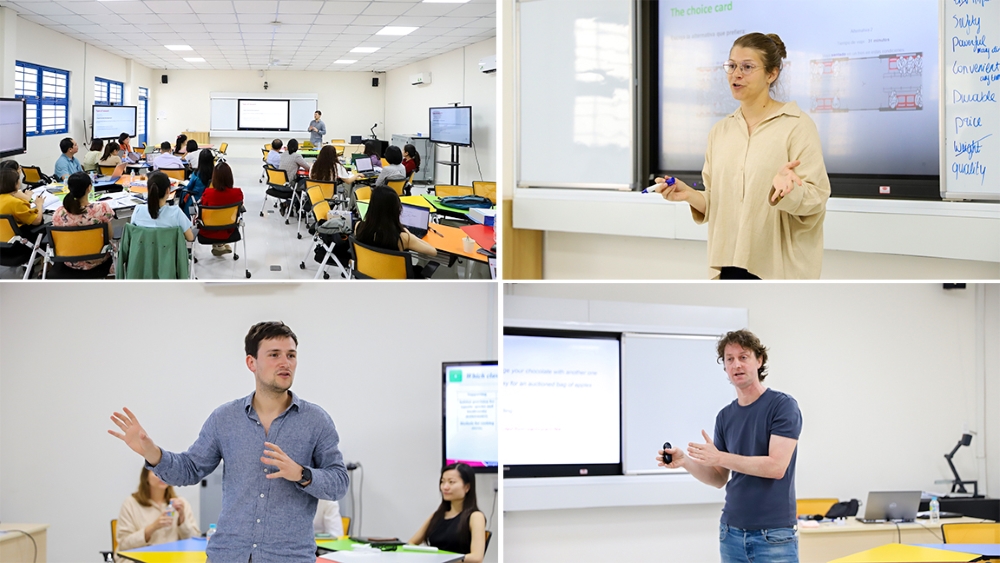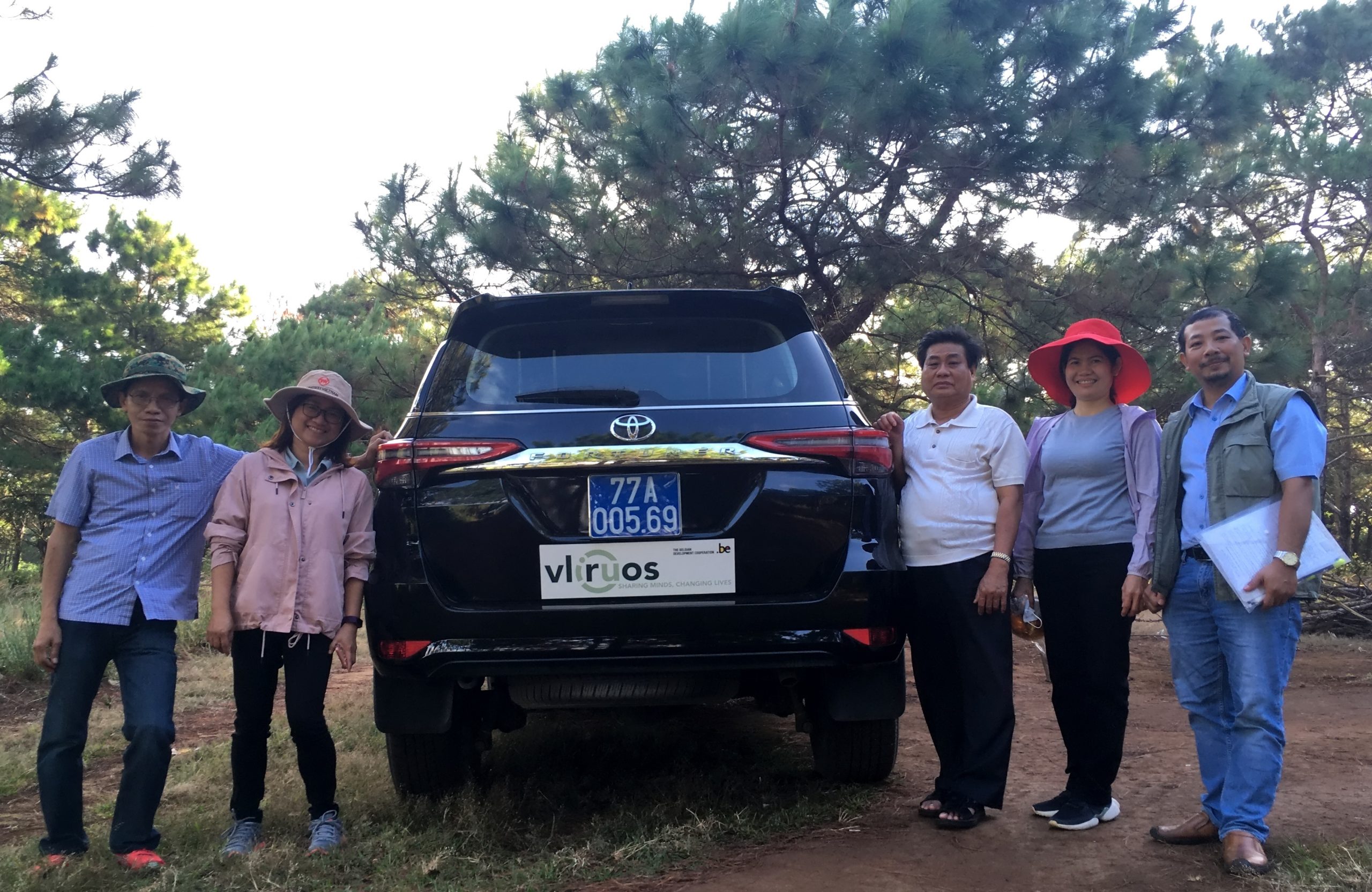Two sandwich PhD positions in Risk Assessment and Risk Management in Fruit Supply Chains
Short summary of the involved universities
Quy Nhon University currently has more than 500 academic staffs employed in 3 faculties and 9 academic departments providing 46 bachelor’s, 22 master’s and 3 doctoral programmes in the disciplines of pedagogy, natural sciences, social sciences and humanities, engineering and technology, and economics, for nearly 14,000 students. Since QNU’s establishment 45 years ago, the University has obtained major achievements, and holds the 26th place in Vietnam, according to the Ranking Web of Universities (webometrics.info, accessed on 1st October 2022).
Ghent University is an internationally renowned, open, pluralistic and socially engaged university in Belgium. It was founded in 1817. It hosts 11 faculties 50,000 students in more than 200 programmes. Ghent University has 15,000 employees. Occupying the 74th place in the 2022 Shanghai Ranking (Academic Ranking of World Universities) it is the highest ranked Belgium university.
The University of Antwerp is a major Belgian university located in the city of Antwerp. The University of Antwerp has about 20,000 students, which makes it the third-largest university in Flanders. The University of Antwerp is characterised by its high standards in education, internationally competitive research and entrepreneurial approach. It was founded in 2003 after the merger of three smaller universities. The University of Antwerp ranks between the 201 and 300th place according to the Academic Ranking of World Universities.
- ABOUT THE IUC PARTNERSHIP WITH QUY NHON UNIVERSITY AND THE SUB‑PROJECT
Quy Nhon University (QNU) was selected by the Flemish Interuniversity Council-University Development Cooperation (VLIR-UOS) as a partner university to start an Institutional University Cooperation (IUC) partnership. This IUC partnership capacity building at QNU (IUC QNU partnership) has run from 1 September 2022 to 31 August 2027 (Phase 1) and continue in the next five years (Phase 2) under the coordination of University of Leuven (KU Leuven), Belgium. The objective of such an IUC is institutional capacity building, enabling the university to fulfill its role in terms of education, research and strengthening the university-industry linkages and technology transfer. The IUC QNU partnership aims to sustainably boost the livelihoods of farmers and living conditions of residents in the South Central Coast and Central Highlands in Vietnam by enhancing education, research and service delivery capacities in agricultural/food/environmental sciences and renewable energy. These objectives will be achieved through five theme-based sub-projects (SP1-SP5), two transversal institutional strengthening sub-projects (SP6-SP7) under the coordination of a Project Support Unit (PSU). The several Flemish Higher Education Institutions (FHEIs), namely University of Leuven (KU Leuven), Ghent University (Ugent), University of Antwerp (UA), Hasselt University (UHasselt) University of Applied Sciences and Arts (HOGENT), and University of Applied Sciences (VIVES), are partners in this partnership.
Sub-project 5 focuses on risk assessment and risk management models for the dragon fruit and jujube supply chains. Fruit production in Vietnam has increased steadily with ever-increasing land use over the years. However, the fruit value chains are not particularly efficient. Farmers must sell their products at prices determined by traders due to their lack of market information and trading strategies. Before reaching consumers, their crops pass through many intermediaries (small retailers, dealers, wholesalers and distributors) due to traditional trade practices. This makes the fruit supply chains in Vietnam longer and more complex than in developed countries, leading to low levels of traceability and stability in terms of the fruit quality and benefit for farmers. Dragon fruit and jujube are tropical agricultural produce suitable for the harsh climate conditions in Ninh Thuan and Binh Thuan and fit into the region’s climate adaptation strategy. Dragon fruit is the leading fruit export of Vietnam and is identified as the first among 11 fruits with a competitive advantage in the regional agricultural developmental strategy. Jujube is a high nutritious fruit but has a low economic value for farmers at present, due to consumer skepticism as to its safety. Like most Vietnamese fruits, the major issue in the dragon fruit and jujube supply chains is the frequent imbalance between supply and demand, which leads to unsustainable production and the instability of the local farmers’ income. In addition, farmers, the first actor in the supply chain, lack knowledge of quality control as well as responsibility for their agricultural products. The objective of the sub-project therefore is to improve the livelihood of these farmers.
- WHO WE ARE LOOKING FOR
2.1. PhD position in “Identification and measurement of risks along the dragon and jujube fruit supply chains”
The PhD research’s aim is to build a risk assessment model of the current dragon fruit and jujube supply chains. This entails following actions
- Mapping the supply chains;
- Determining possible risks by conducting expert interviews/surveys along the supply chains and classifying these risks into risk groups;
- Evaluating the risks and calculating weight of each risk.
The successful candidate is expected to have strong background in Business Administration, Agricultural Economics and computer skills such as SPSS, Stata, R. In particular, the successful candidate should be a good communicator in English and wish to become a researcher as part an international team.
Supervisor: Prof. Speelman Stijn (Ghent University)
Local co-supervisor: Dr. Truong Thi Thanh Phuong (Quy Nhon University)
2.2. PhD position in “Establishment of risk management mechanisms and farmers preferences with regards to these in the dragon fruit supply chain”
This PhD position entails the evaluation of different risk management instruments for the dragon fruit supply chain. In a participatory way a risk management mechanism will be developed and established, while also assessing farmers preferences concerning the modalities of the mechanism.
The successful candidate is expected to have strong background in Business Administration, Agricultural Economics and computer skills such as SPSS, Stata, R. In particular, the successful candidate should be a good communicator in English and wish to become a researcher as part an international team.
Supervisor: Prof. Steven Van Passel (University of Antwerp)
Local co-supervisor: Dr. Truong Thi Thanh Phuong (Quy Nhon University)
- WHAT WE CAN OFFER YOU
A PhD selected for each sandwich PhD program has 4 research stays (up to 24 months) at Ghent University or the University of Antwerp including a monthly stipend of €1900 and 04 return tickets. The remaining time of the PhD research will be performed at Quy Nhon University (Vietnam). The PhD candidates will have a commitment to work for QNU after graduation.
- HOW TO APPLY
Please send your application by email by December 30, 2022. Application package includes:
- Your detailed CV,
- A motivation letter,
- Electronic versions of your academic records,
- Proof of English proficiency,
- Recommendation letter from at least one referee.
Further information on the next phases will be sent on January 5, 2023 to the pre-selected PhD candidates. Please do not hesitate to contact us if you have any questions via:
Prof. dr. ir. Stijn Speelman, tel.: 003292649375, e-mail: stijn.speelman@ugent.be
Prof. dr.ir. Steven Van Passel, tel.: 0032472930023, e-mail: steven.vanpassel@uantwerpen.be
Dr. Truong Thi Thanh Phuong, tel.: (+84) 945987068, e-mail: truongthithanhphuong@qnu.edu.vn










